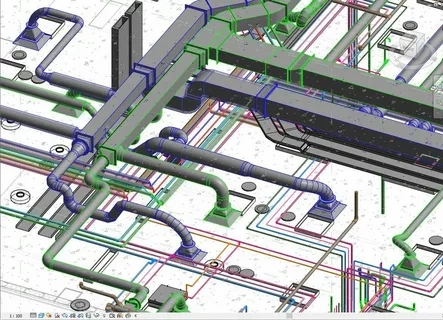In the realm of construction and infrastructure development, the importance of Mechanical, Electrical, and Plumbing (MEP) engineering cannot be overstated. MEP engineering design services play a pivotal role in ensuring the functionality, efficiency, and sustainability of buildings and structures. From large-scale commercial complexes to residential buildings, MEP engineers are the unsung heroes working behind the scenes to bring comfort, safety, and convenience to our built environment.
Understanding MEP Engineering Design Services
MEP engineering encompasses a broad spectrum of disciplines, including mechanical, electrical, plumbing, and sometimes fire protection engineering. These services are crucial for the planning, design, and implementation of building systems that control environmental conditions, provide power, ensure water supply and sanitation, and maintain fire safety standards.
Mechanical Engineering:
Mechanical engineers focus on heating, ventilation, and air conditioning (HVAC) systems, ensuring that indoor environments are comfortable and conducive to human occupancy. They design systems that regulate temperature, humidity, and air quality while optimizing energy efficiency.
Electrical Engineering:
Electrical engineers are responsible for designing electrical systems that power the building's lighting, equipment, and appliances. They ensure that electrical distribution networks are safe, reliable, and compliant with building codes and regulations.
Plumbing Engineering:
Plumbing engineers design water supply, drainage, and sewage systems, ensuring efficient distribution and disposal of water within a building. Their expertise is vital for maintaining sanitation and preventing water-related issues such as leaks and flooding.
Fire Protection Engineering:
In some cases, fire protection engineers are also part of MEP teams. They design fire detection and suppression systems, as well as develop evacuation plans to ensure occupants' safety in case of emergencies.
The Role of MEP Engineering in Sustainability
In an era marked by increasing environmental concerns and the urgency of climate action, MEP engineering plays a crucial role in promoting sustainability within the built environment. By implementing energy-efficient HVAC systems, optimizing lighting design, and incorporating renewable energy sources such as solar panels, MEP engineers contribute to reducing carbon emissions and minimizing the ecological footprint of buildings.
Moreover, MEP engineers strive to design systems that conserve water, minimize waste, and promote efficient resource utilization. From implementing rainwater harvesting systems to specifying low-flow fixtures and water-efficient appliances, their efforts contribute to sustainable water management practices.
Challenges and Innovations in MEP Engineering
The field of MEP engineering is not without its challenges. Rapid technological advancements, evolving building codes, and increasingly complex project requirements demand continuous innovation and adaptation from MEP professionals. Moreover, balancing the often conflicting priorities of cost-effectiveness, energy efficiency, and occupant comfort requires a multidisciplinary approach and creative problem-solving skills.
Fortunately, advancements in Building Information Modeling (BIM) and computer-aided design (CAD) technologies have revolutionized the way MEP engineering is practiced. These tools enable engineers to visualize designs in 3D, simulate system performance, and detect potential conflicts before construction begins. Additionally, the integration of smart building technologies and IoT (Internet of Things) sensors allows for real-time monitoring and optimization of building systems, further enhancing efficiency and sustainability.
Conclusion
In conclusion, MEP engineering design services are indispensable for the successful planning, design, and implementation of building systems that ensure comfort, safety, and sustainability. From optimizing energy usage to promoting water conservation and integrating cutting-edge technologies, MEP engineers play a vital role in shaping the future of our built environment. As we continue to strive for more efficient, resilient, and eco-friendly buildings, the expertise and innovation of MEP professionals will remain instrumental in achieving these goals.


